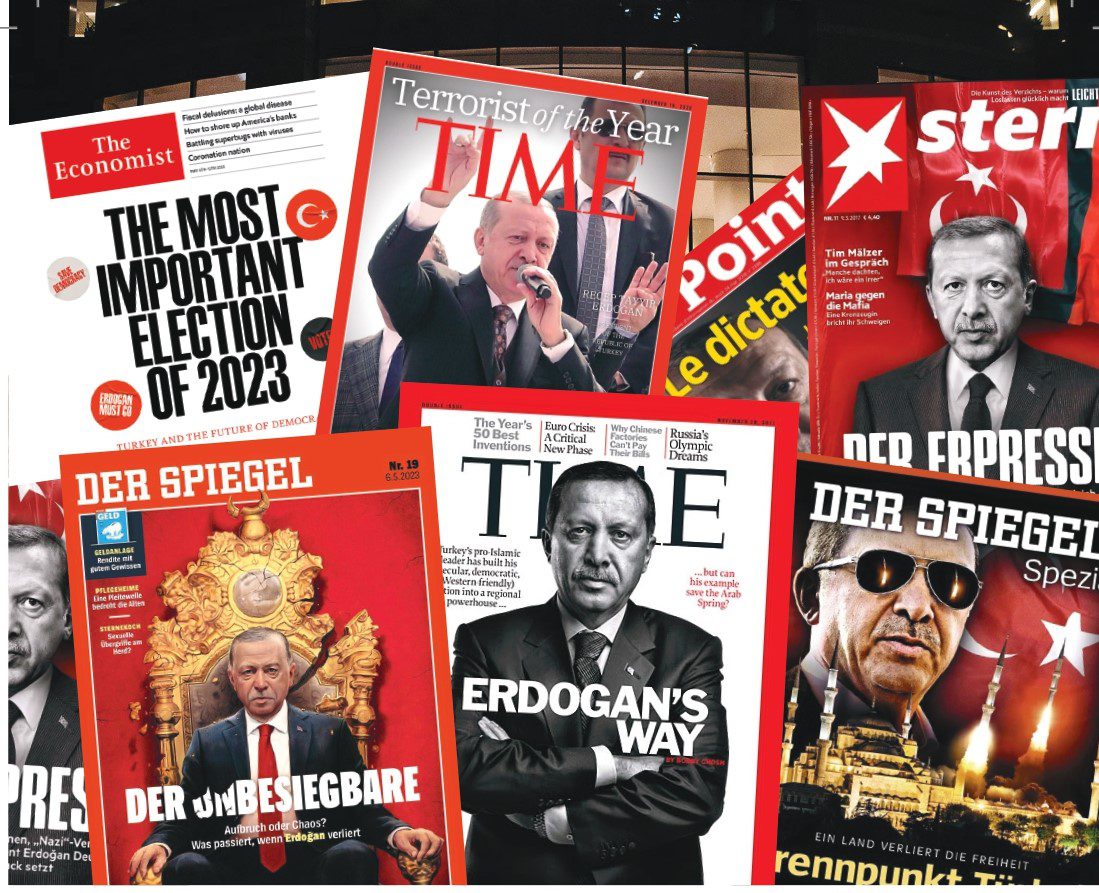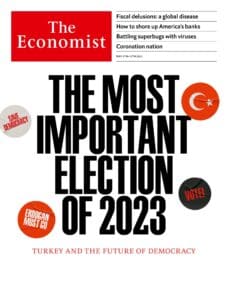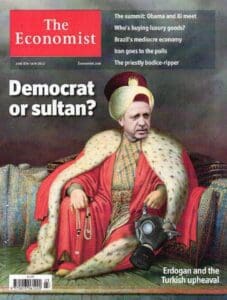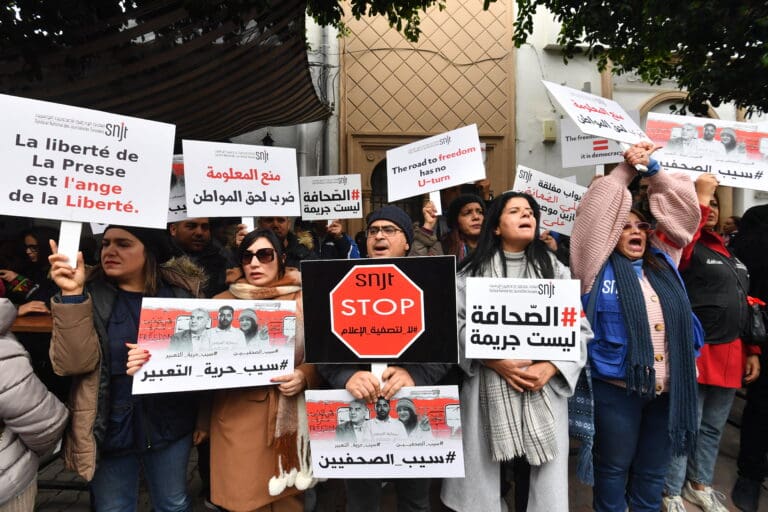
Türkiye’s Consequential Elections
and Western Media Coverage
Issue Brief, December 2023
Key Takeaways
Türkiye’s 2023 elections were consequential locally and internationally: The 2023 presidential and parliamentary elections in Türkiye were especially important for the country and the West, which explains the heightened attention to the elections in many Western media outlets.
Anti-Erdogan Sentiments in Western Media: Western media’s coverage of the 2023 Turkish elections, and especially its framing of President Recep Tayyip Erdogan’s image, revealed a number of deeply ingrained stereotypes and underlying biases. The overall tone was clearly anti-Erdogan and favored the leading opposition candidate, Kemal Kilicdaroglu.
Contrasts Between European and American Media Coverage: Although both European and American media generally adopted an anti-Erdogan stance in their coverage, American media seemed relatively more balanced and issue-focused, while European media seemed relatively more hostile and more personality-focused in their criticism.
The Western Media’s Post-Election Tone Shift: After Erdogan’s victory, many Western media outlets pivoted from their previously hostile tone towards him in favor of a more pragmatic approach focused on mutual interests and strategic cooperation between the leader’s administration and Western states.
Introduction
There is little doubt that modern Türkiye and its current leadership pose a serious dilemma for many countries in the West. On one hand, the country is a rising star in the international arena, thanks to its growing geostrategic influence based on its membership in the North Atlantic Treaty Organization (NATO), unique geographic location which bridges Asia and Europe, growing economy, and increasing diplomatic weight. On the other hand, there has been constant Western unease about Türkiye’s human rights record and the perceived strongman leadership style of its current leader.
As such, the European and American media coverage of the 2023 Turkish presidential elections deserves special attention, as it reflects many of these ongoing tensions and contentions. This issue brief contextualizes the nuances and complexities of the Western media’s framing of the consequential 2023 elections within relevant political and geostrategic contexts. It explains how, and why, these mediated narratives and frames evolved during the elections and after. Furthermore, it sheds light on the underlying narratives about the dynamics of the elections and examines the explanatory factors behind the different types of coverage in European and American media outlets.
The Significance of Türkiye’s 2023 Elections
Türkiye’s 2023 elections, which occurred 100 years after the founding of the secular republic, carried immense historical and geopolitical weight. Western states, especially the United States (U.S.) and its European allies, feared that a victory for incumbent President Recep Tayyip Erdogan could usher in an era of potential regional confrontation. Others were concerned that an Erdogan victory would solidify the leader’s political powers, moral authority, and religious conservatism.1 The election results held significant consequences for security in Europe and the Middle East, as they would determine Türkiye’s foreign policy approach on a wide array of issues, ranging from shifting relationships with the United States, Russia, and the European Union (EU), to a different role in the war in Ukraine.2
Opposition unity was at an unprecedented high, marking the first major challenge to Erdogan since his Justice and Development Party (AK Party) came to power. Several opposition groups coalesced around the common goal of defeating Erdogan, whom they perceived as “weaker than ever.”3 This view was echoed in international coverage of the election, as commentators predicted a potential political transition. This opposition alliance, which came to be known as the Nation Alliance or the Table of Six, was comprised of six political parties from across the political spectrum and was united under the leadership of Kemal Kilicdaroglu, the leader of the Republican People’s Party (CHP).4 It presented itself as the new hope for liberalism, secularism, democracy, press freedom, and the de-politicization of the judiciary—reforms which could have possibly moved Türkiye closer to the West. In addition, the alliance promised to release political prisoners and facilitate Türkiye’s quest to join the EU, an objective so far hampered by Türkiye’s human rights record, amongst other reasons.5
With Türkiye at a crossroads, its electorate would either choose more of Erdogan’s economic, political, and geostrategic policies, with all their pros and cons, or go in a different direction. The opposition alliance promised to fight identity politics, end polarization, eliminate corruption, and promote democracy.6 However, it was unable to present its plans clearly enough and lacked cohesion among its ranks. Ultimately, the first choice prevailed in the election.
Anti-Erdogan Frames in Western Media Coverage
When the results of the first round of the Turkish elections showed a narrow margin between Erdogan and Kilicdaroglu, some European and U.S. media outlets started predicting a Kilicdaroglu win. Their forecast was based on Turkish citizens holding Erdogan accountable for the country’s recent economic challenges.7 Other commentators cited the Turkish people’s reported dissatisfaction with the government’s response to the catastrophic earthquake that hit Türkiye and Syria in February 2023.8
In their election coverage, major Western media outlets such as The Economist, BBC, and The Washington Post were highly critical of the Erdogan government’s human rights record, emphasizing its curbing of public freedoms, including press freedom, and its persecution of opposition figures and journalists.9 Other Western media outlets routinely criticized Erdogan’s domestic and foreign policies and his handling of the migration issue and refugee crisis.10 Magazines such as France’s Le Point and L’Express, as well as the U.S.-based Foreign Policy, even questioned the fairness of the elections.11
Figure 1 below features the cover page of an issue of The Economist published in May 2023. The issue is titled “The Most Important Election of 2023” and adorned with tags such as “Save Democracy,” “Erdogan Must Go,” and “Vote.”12 In the same issue, The Economist, which adopted a hostile editorial policy towards Erdogan, predicted that opposition leader Kilicdaroglu would win, which it claimed “would show democrats everywhere that strongmen can be beaten.”13
Figure 1: The cover pages of the May 2023 issue of The Economist entitled “The Most Important Election of 2023”14 and the June 2013 issue of The Economist entitled “Democrat or Sultan?”15


Similarly, the French magazine Le Point described Erdogan on one of its covers as “the other Putin,” while another French magazine, L’Express, linked him to the risk of chaos.16 In contrast, some Western media outlets portrayed Kilicdaroglu as the champion of democracy, liberalism, and progressiveness. In fact, before the first round of elections, Western media orchestrated a propaganda campaign in the opposition leader’s favor, forecasting that he would win this round of elections. For instance, a TIME magazine article referred to him as “the man who could beat Erdogan.”17 However, this turned out to be merely wishful thinking based on unfounded assumptions.
The negative framing of Erdogan, juxtaposed with the more favorable framing of his secular opponent as a more liberal and pro-Western candidate with a “softer foreign touch,”18 led Turkish Foreign Minister Mevlut Cavusoglu to accuse the Western media of biased reporting and interference in his country’s internal affairs.19
Contrasts Between European and American Media Coverage
Despite overarching similarities, the overall tone of European media outlets was generally more hostile and negative towards Erdogan than that of U.S. media outlets, and this pattern continued in their coverage of the recent elections. The framing of Erdogan as an authoritarian leader and dictator longing for the return of the Ottoman empire20 dominated most European media coverage both before and during the 2023 elections. For example, the BBC produced a documentary series in May 2023 titled “Turkey: Empire of Erdogan,”21 which portrayed Erdogan as a political leader with an appetite for increased regional power, international influence, and unchallenged authority.
Such coverage continues and builds on long-standing negative coverage of Erdogan in the European press, such as the cover of The Economist’s 2013 issue entitled “Democrat or Sultan?” that criticized Erdogan’s handling of the protests which erupted against him that year (see figure 1). This framing of the president as a “Sultan,” an “Emperor,” or an aspiring Calipha of the entire Muslim world, rather than a democratically elected leader, dominated the European media’s coverage of the 2023 elections.
Similarly, an article in The Guardian described Erdogan as “Turkey’s two-faced ‘sultan’” who is “no friend of the West.”22 Even though the article discussed the perception of Türkiye as a critical ally to the West because of its significant geographic location and other factors, the writer asserted that Erdogan is not contributing to that alliance and that he needs to face repercussions for his anti-Western actions.23 The article referenced specific incidences and policy decisions by Erdogan, but its main argument hinged on portraying him as a dictator and profiling him as someone who cannot be trusted by using adjectives such as “neo-Ottoman” and “sneaky.”24
Another article, published in The Economist, warned that “Turkey is on the brink of dictatorship.”25 It discussed how Erdogan’s anti-Western political actions could affect Türkiye itself, and not just Western countries. While also analyzing how Western leaders should engage with Erdogan, this article characterized Erdogan as a dictator. Erdogan was, again, described as “autocratic” and as someone who is heading towards joining a “dictator’s club.”26 While this article did not seem as accusatory as The Guardian article, both focused on portraying Erdogan as a “dictator” and an “autocrat” who cannot be trusted by the West and, therefore, needs to be challenged.
Similarly, a France 24 article, while providing an overview of Erdogan’s political career and his most important political milestones, describes the leader as “mercurial.”27 The piece summarizes how Erdogan’s detractors perceive him, citing the language other European media have used to characterize Erdogan, including commonly used terms such as “authoritarian” and “Sultan.”28 Even though the article explores multiple opinions about the leader, the overall tone and language characterize him as a “dictator” who is nostalgic for Türkiye’s Ottoman past.29
In contrast, most American media outlets adopted a more balanced and issue-based position compared to their European counterparts when criticizing Erdogan and commenting on the elections. For example, an article in The Washington Post tackled the fairness and transparency of the election process.30 It focused on the Turkish elections as a case study, while questioning the fairness of the electoral process and the objectivity of the Turkish government and Turkish media, considering the fact that one of the main candidates is the head of the state.31 Unlike the previously discussed examples from the European media outlets, this article focused on the dynamics of the election process itself, including the voting mechanisms and the media coverage, rather than fixating on Erdogan’s character and leadership style.
Another example is an article in Forbes, the leading U.S.-based economics magazine, which provided in-depth economic and political analysis of the context surrounding Türkiye’s 2023 election.32 While the piece mentions Erdogan and his party’s impact on the country, it does not level character attacks. Rather, it analyzes the country’s overall political and economic context as they relate to the elections. The author discusses a number of controversies, including the aftermath of the two catastrophic earthquakes which impacted Türkiye and their devastating humanitarian and economic consequences. The article frames the mismanagement of the aftermath of these natural disasters as the responsibility of the Turkish government and its various branches.33
In contrast, European outlets such as BBC framed the crises’ mismanagement as solely Erdogan’s responsibility.34 Again, this reflects the tendency of mainstream European media to specifically, and oftentimes narrowly, focus on Erdogan himself—his personality and his leadership style—sometimes at the expense of the broader and more nuanced socio-economic and political context surrounding the consequential elections.
However, there are exceptions to this general pattern, such as some descriptions of Erdogan as a tyrant who craves absolute rule.35 This terminology aligns more with the overall tone of many European media outlets than that of mainstream American media when commenting on Türkiye’s elections. Some right-leaning, conservative U.S. media outlets, such as Fox News, adopted a hostile editorial policy not just towards Erdogan, but towards Türkiye as a whole, framing the country as “Russia’s secret weapon inside NATO” and accusing it of adopting positions in NATO that are only based on self-interest and the country’s ties with Russia.36
Western Media Resetting Their Tone After Erdogan’s Victory
The election result has not only reset Türkiye’s international relations but has also shifted the Western media’s tone regarding the country, its re-elected leader, and its relationship with the West. Following the election, the tone switched to stressing the significance of working together with Türkiye to secure mutual strategic interests. In some cases, there has even been praise and recognition for Türkiye approving Sweden’s NATO accession.
For example, an article published in the US News and World Report covered Erdogan’s meeting with U.S. President Joseph R. Biden on the sidelines of the NATO summit in Lithuania; the piece was optimistic about the improvement of Türkiye’s relationship with the United States.37 It also mentioned that, “Fresh from handing Joe Biden a diplomatic victory by easing Sweden’s path into NATO, Turkish President Tayyip Erdogan wished the U.S. president good luck in his 2024 re-election campaign.”38 It highlighted the fact that Biden is focusing on building international alliances as an important part of his 2024 presidential campaign platform.39
Interestingly, conservative-leaning media outlets which are known for their anti-Muslim discourse and anti-Türkiye rhetoric, such as Fox News,40 changed their tone when Türkiye finally approved Sweden’s NATO membership. This move angered Russia but pleased the U.S. and its Western allies by allowing NATO to expand its fortification against Russia amidst the war in Ukraine.41 This is a significant shift from Fox News’ earlier pattern of coverage. In fact, Türkiye’s strategic step to support Sweden’s NATO membership received favorable coverage in several U.S. and European media outlets. This is a signal that, despite Western fears about Erdogan’s third term, Türkiye could side with the U.S. and its Western allies even if they upset Moscow, as long as they are acting in Ankara’s interests, which in this case meant receiving the long-awaited approval for the F-16 deal.42
However, one of the country’s long-term aspirations remains EU membership, something it has been tirelessly working towards for years. Türkiye’s recent tactical steps could make this goal more attainable in the future. The coverage of Türkiye after it approved Sweden and Finland’s NATO membership signaled a new openness to cooperation, not just with the United States, but also with Europe and Scandinavian countries.43
Conclusion
While the Western media’s unease towards Erdogan’s Türkiye—and towards the leader himself—is expected to persist, the strategic interests of these Western countries, coupled with their specific media outlets’ overarching editorial policies will determine the tone, intensity, and persistence of their coverage.
When discussing the discrepancies between the narratives that have been adopted by European and U.S. media in their coverage of the Turkish elections, it is important to bear in mind the discrepancies within, not just between, these media outlets. It is key to avoid a “one size fits all” approach when analyzing their coverage of both the Turkish elections and Türkiye’s leader, and one should consider the complex drivers behind each platform’s coverage.
Finally, contrary to fears that the Western media’s coverage might have negatively impacted Erdogan’s chances to win, it seems that it might have had the opposite effect by galvanizing his base. Negative Western coverage may have boosted Erdogan’s popularity among the Turkish people as a nationalistic leader who is targeted by Western media in retaliation for his patriotism. Prior to the election, some warned that any attempt by Western nations to influence the results of the elections, no matter how subtle or indirect, could backfire.44 The predominantly anti-Erdogan campaigns might have done just that, as Erdogan emerged as a defiant leader capable of defeating not just his domestic opponents but also his international foes and critics.
Endnotes


